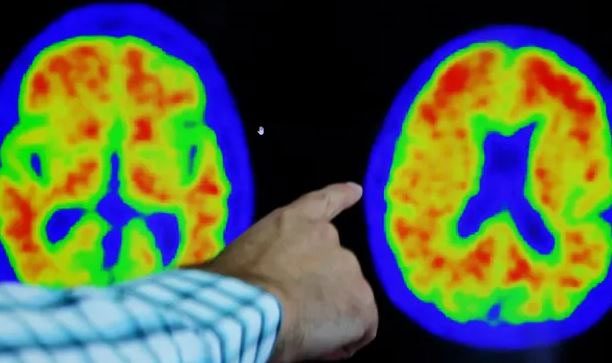The drug donanemab has been shown to reduce the risk of memory and cognitive decline in Alzheimer’s patients by approximately 30%, but this rate doubles to 60% if treatment begins early.
Results from the donanemab Alzheimer’s treatment trial conducted by the pharmaceutical company Eli Lilly (USA) indicate that the drug is most effective when patients are treated early, ideally before symptoms develop.
This information promises to lead to breakthroughs in the treatment of dementia.

PET scan of an Alzheimer’s patient’s brain. (Source: Reuters).
According to the latest trial data presented at the International Alzheimer’s Association Conference in Amsterdam (Netherlands) on July 17, donanemab has been demonstrated to reduce the risk of memory decline and cognitive impairment in Alzheimer’s patients by about 30%, but this rate increases to 60% if treatment begins at the onset of mild symptoms.
Research results involving over 1,700 patients show that donanemab is less effective for patients in later stages, the elderly, and those with high levels of Tau protein, which drives the progression of Alzheimer’s disease.
Anne White, head of neuroscience at Eli Lilly, stated that these results highlight the importance of early detection and diagnosis in the treatment of Alzheimer’s.
Eli Lilly hopes that the U.S. Food and Drug Administration (FDA) will approve donanemab for use by the end of this year.
The company also mentioned that it is submitting applications for approval to regulatory agencies worldwide, with the process expected to be completed by the end of the year.
Donanemab is an intravenous antibody designed to remove the clumps of a protein called beta-amyloid from the brains of Alzheimer’s patients.
Recently, the U.S. FDA approved leqembi, which has a similar mechanism of action to donanemab, developed in collaboration by Japan’s Eisai Group and the U.S. company Biogen. This drug is intended for patients with early-stage Alzheimer’s.
This is the first Alzheimer’s treatment to receive the FDA’s “green light”, considered a significant breakthrough in Alzheimer’s treatment.
According to the Alzheimer’s Association, over 6 million Americans are living with Alzheimer’s, and by 2050, this number is expected to rise to nearly 13 million.
Meanwhile, the World Health Organization (WHO) reports that there are currently over 55 million people worldwide living with Alzheimer’s or other forms of memory decline.



















































